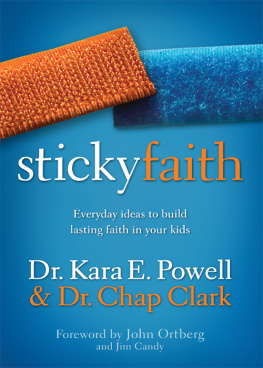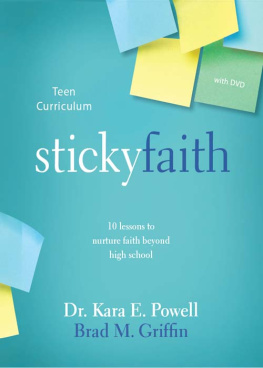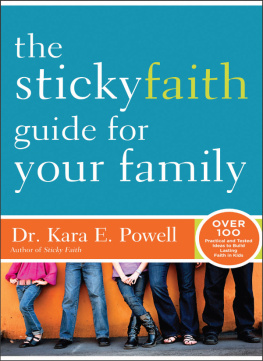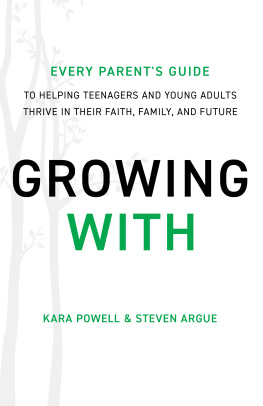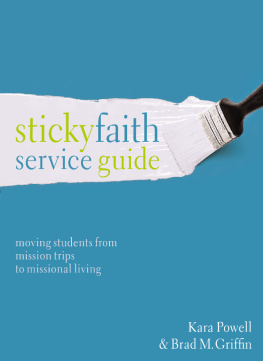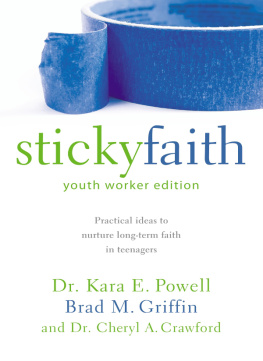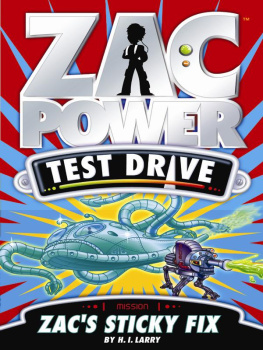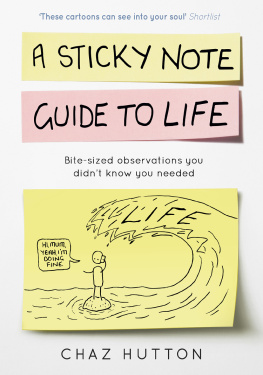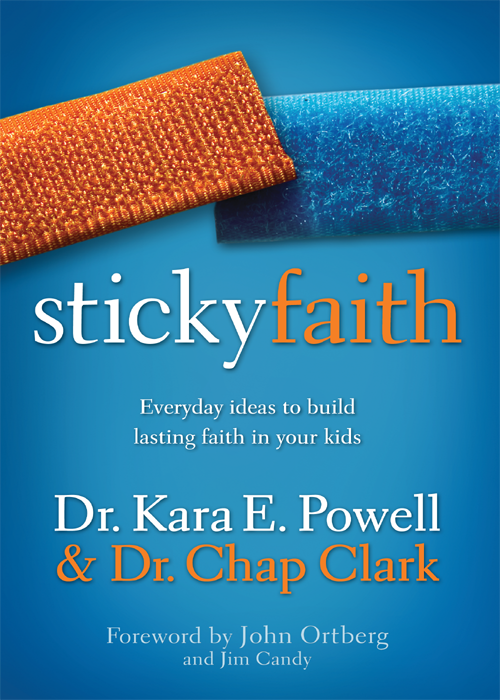Tom is a high school freshman at our church who is similar to others his age. He loves sports and girls, and his life is trapped in a perpetual cycle of homework and busyness. By all accounts, he is a normal high school kid.
But Tom has something that makes him different. He is being pursued by a church that is dedicated to prepping its entire congregation to encourage faith in young people. We fail a lot at Menlo Park Presbyterian Church, but one of our key goals is to have many adults who know and love kids like Tom and point them to Jesus Christ. It isnt just a ministry strategy; its the theological conviction that this is what the church is called to be.
Recently, Tom ran into a thirty-year-old member of our church named Mike, and they laughed and talked for a few minutes. When the conversation ended, Tom turned to his mom and said, Mom, I will always follow Jesus.
Nothing could have meant more to this mom. Why? she said.
Because there are so many guys like Mike at our church who I know love me, he said. I want to be like that. Kids experience Jesus Christ when adults in the church give them grace, time, and genuine love with no hidden agenda.
But here is the sad reality: Tom is the exception, not the norm. Most kids lack connection to and investment from a church community that is mobilized to reach them. Very few churches have transformed their culture to see kids as a mission field on their own campuses.
No one has diagnosed and communicated the heart of this problem like Chap Clark and Kara Powell.
To say that Menlo Park Presbyterian Churchs philosophy has been influenced by the work and thought of Chap Clark and Kara Powell is a massive understatement. Chap and Kara are leading the way forward in thoughtful, theological reflection about kids and faith in todays changing landscape. These are some of the deepest thoughts you will read about todays kids and their faith.
But what is so helpful about this book is its immensely practical help. Kara and Chap are in constant dialogue with real world youth workers. Turning theory into concrete practice matters to us. It matters to Tom too, although he may not realize it yet. And it matters to anyone who dedicates their time, energy, and even their whole lives to seeing young people embrace Jesus Christ at the core of who they are.
Chap and Kara have a dream that kids like Tom eventually will be the norm, not the exception. Sticky Faith is more than another book about kids and their faith; its a journey into the heart of every adult who is forced to respond to the question of what, really, the church of Jesus Christ is called to be.
The insights found in these pages result from the collective work of a phenomenal team of parents, grandparents, researchers, youth leaders, and Fuller students. Special thanks to Dr. Cameron Lee for his steady consultation and leadership throughout this process, to Brad Griffin and Dr. Cheryl Crawford for their invaluable insights and contributions to the research, to Dr. Chloe Teller for keeping the team on track, to Dr. Erika Knuth for crunching so many numbers, to Irene Cho for keeping the Fuller Youth Institute (FYI) running while we were preoccupied with this project, and especially to Dr. Krista Kubiak Crotty for asking the initial question that launched this whole adventure.
Wed also like to thank others who have served as part of the FYI staff and research team during this process, including Cody Charland, Nikki Chase, Emily Chen, Rana Choi Park, Marianne Croonquist, Kris Fernout, Dr. David Fraze, Mike Hensley, Andrea King, Melanie Lammers, Dr. Lydia Mariam, Meredith Miller, Paul Walker, and Matt Westbrook.
This book was made much better because of the input of wise friends and parents who took the time to give us feedback, including Dave Powell and Dee Clark (we wanted to mention them first), as well as Roger and Lilli Bosch, Cindy Go, Toben Heim, Kathy Hernandez, Jeff and Jenny Mattesich, Christa Peitzman, and Adam and Nancy Stiles.
FYI wouldnt exist without other enthusiastic Advisory Council members and passionate supporters, including (but not limited to) Dale and Mary Andringa, Noel Becchetti, Barbara Bere, Jim and Judy Bergman, Max and Esther De Pree, April Diaz, David and Carol Eaton, Sted and Robin Garber, Walter and Darlene Hansen, Megan Hutchinson, Ken Knipp, John Lewis, Mark Maines, John and Chris Mumford, Brian and Linda Prinn, Sam and Betsy Reeves, Roy and Ruth Rogers, Albert Tate, Jeremy Taylor, Ron and Sharon Vander-Pol, Gabe Veas, Mike and Valerie Volkema, Scott Watt, Dale Wong, Jeff Wright, the Tyndale House Foundation, the Servants Trust, the Thrive Foundation, the Vermeer Charitable Foundation, and the Stewardship Foundation. A special, heartfelt thanks to both the Lilly Endowment for funding much of our Sticky Faith research as well as Wally Hawley for his invaluable coaching and many pearls of wisdom.
Your work has stuck with us and we are eager to see how the Lord builds even more Sticky Faith in kids.
1
the not-so-sticky-faith reality
My parents are probably the biggest influence out of anybody.
Robyn
Both my mom and my dad have spent hours and hours and hours through my life talking to me about what it means to be a Christian, what it means to follow God, and what that should entail and how to do it.
Billy
Tiffany had failed to turn out like Phil and Amy had hoped.
Like most parents, Phil and Amy had great visions of who their daughter would become as she entered high school and college.
Their expectations were high in part because Tiffanys first steps down the yellow brick road of adolescence showed great promise. As a ninth grader, Tiffany was deeply committed to knowing Jesus and making Jesus known. While friends shared horror stories about their kids sullen attitudes, moodiness, and flagrant disregard for family rules, Tiffany was generally pleasant and obedient. Tiffany had lots of friends, but she also enjoyed being with her parents. And Phil and Amy enjoyed being with her.
From the first Sunday that she walked into the high school ministry at the church where I (Kara) served as one of the youth pastors, Tiffany plunged into every church activity possible. Any event that was offered youth choir, beach days, weekend service trips to Tijuana Tiffany was there. Not only was she there, but she usually showed up to church at least thirty minutes early to see if she could help.
And help she did. Tiffany was especially good at making posters. She would spread paper across the youth room floor and try to come up with creative images to promote upcoming events or reinforce the teaching topic for the next week. When we made posters together, we talked about our mutual desire to know Jesus and help others know him too.
Sure, Tiffany wasnt perfect, but the other youth group parents envied how easy Phil and Amy seemed to have it with their daughter.

